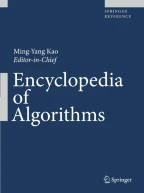Keywords and Synonyms
Competitive market equilibrium
Problem Definition
This problem is concerned with the computational complexity of finding an exchange market equilibrium. The exchange market model consists of a set of agents, each with an initial endowment of commodities, interacting through a market, trying to maximize each's utility function. The equilibrium prices are determined by a clearance condition. That is, all commodities are bought, collectively, by all the utility maximizing agents, subject to their budget constraints (determined by the values of their initial endowments of commodities at the market price). The work of Deng, Papadimitriou and Safra [3] studies the complexity, approximability, inapproximability, and communication complexity of finding equilibrium prices. The work shows the NP-hardness of approximating the equilibrium in a market with indivisible goods. For markets with divisible goods and linear utility functions, it develops a pseudo-polynomial time...
Access this chapter
Tax calculation will be finalised at checkout
Purchases are for personal use only
Recommended Reading
Arrow, K.J., Debreu, G.: Existence of an equilibrium for a competitive economy. Econometrica 22(3), 265–290 (1954)
Codenotti, B., McCune, B., Varadarajan, K.: Market equilibrium via the excess demand function. In: Proceedings STOC'05, pp. 74–83. ACM, Baltimore (2005)
Deng, X., Papadimitriou, C., Safra, S.: On the complexity of price equilibria. J. Comput. Syst. Sci. 67(2), 311–324 (2002)
Devanur, N.R., Papadimitriou, C.H., Saberi, A., Vazirani, V.V.: Market equilibria via a primal-dual-type algorithm. In: Proceedings of FOCS'02, pp. 389–395. IEEE Computer Society, Vancouver (2002)
Eaves, B.C.: Finite solution for pure trade markets with Cobb-Douglas utilities, Math. Program. Study 23, 226–239 (1985)
Garg, R., Kapoor, S.: Auction algorithms for market equilibrium, In: Proceedings of STOC'04, pp. 511–518. ACM, Chicago (2004)
Jain, K.: A polynomial time algorithm for computing the Arrow-Debreu market equilibrium for linear utilities. In: Proceeding of FOCS'04, pp. 286–294. IEEE Computer Society, Rome (2004)
Nenakhov, E., Primak, M.: About one algorithm for finding the solution of the Arrow-Debreu Model. Kibernetica 3, 127–128 (1983)
Ye, Y.: A path to the Arrow-Debreu competitive market equilibrium, Math. Program. 111(1–2), 315–348 (2008)
Author information
Authors and Affiliations
Editor information
Editors and Affiliations
Rights and permissions
Copyright information
© 2008 Springer-Verlag
About this entry
Cite this entry
Huang, LS. (2008). General Equilibrium. In: Kao, MY. (eds) Encyclopedia of Algorithms. Springer, Boston, MA. https://doi.org/10.1007/978-0-387-30162-4_160
Download citation
DOI: https://doi.org/10.1007/978-0-387-30162-4_160
Publisher Name: Springer, Boston, MA
Print ISBN: 978-0-387-30770-1
Online ISBN: 978-0-387-30162-4
eBook Packages: Computer ScienceReference Module Computer Science and Engineering
